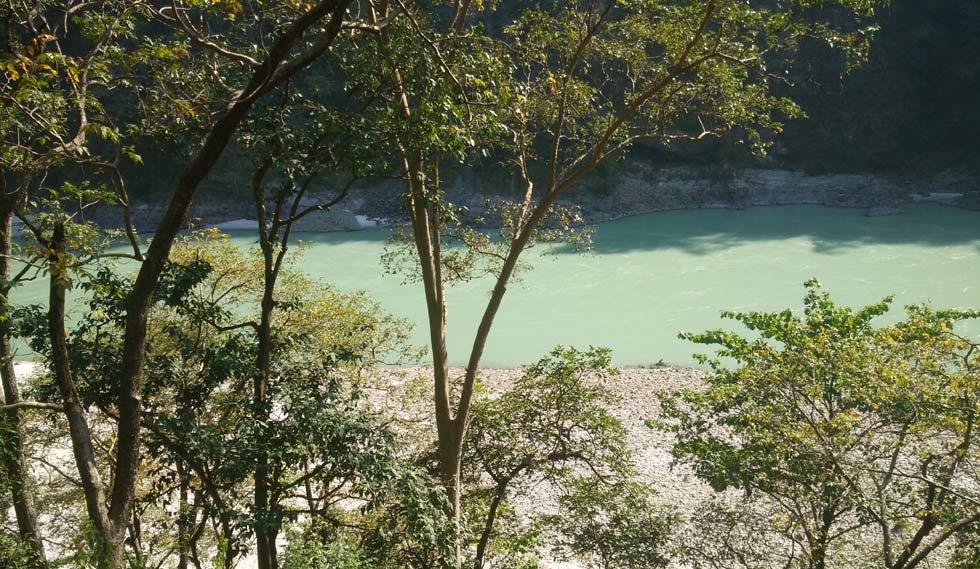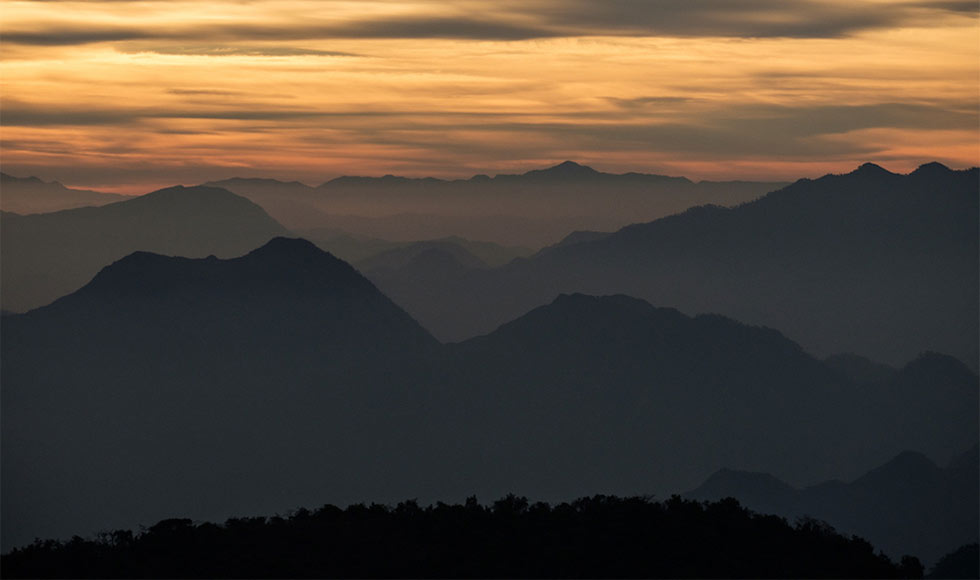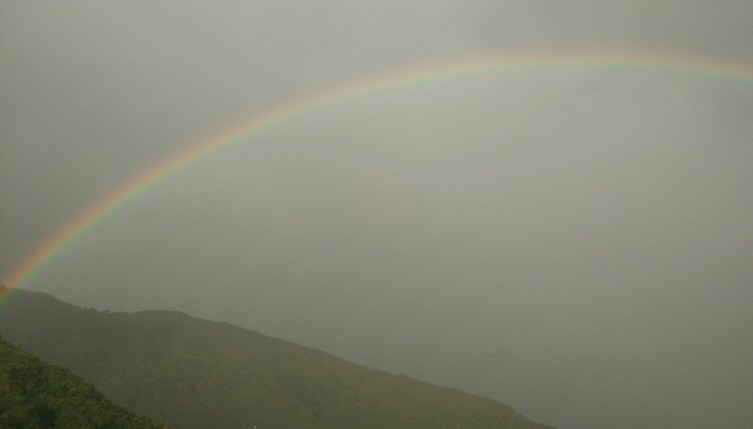
DHRUPAD IN GULAR, RISHIKESH UTTARKHAND, February 2020
As a part of the educational activity of the Naad Chakra Trust (Delhi), this annual Dhrupad retreat with Pandit Nirmalya Dey will be held in a deep forest camp site near the banks of the Himalayan Ganga river, near the village Gular, between February 23, 2020 and March 1, 2020.
The Forest camp is located in pure unspoiled Himalayan jungle. It is rich with flora and fauna. It is populated with a wide variety of bird and the sound of singing is accompanied by a diversity of bird calls. The camp is by a stream and a waterfall and the river Ganga are walking distance. It is a very special experience to practice Dhrupad intensely in this Himalayan forest camp.
Every year students who are interested in learning Dhrupad, the core of Indian Classical music come together from all over the world for an annual Dhrupad retreat to train intensively with renowned Dhrupad singer Pandit Nirmalya Dey. IN 2016 the retreat was held in the holy city of Varanasi, in 2017 in the Himalayan village of Dharamkot, in 2018 by the banks of the Himalayan Ganga in the village of Gular, Rishikesh and in 2019 in a Himalayan deep forest camp by the village Gular.
Dhrupad requires regular practice at home. This home practice is inspired, energized and enhanced by the annual retreat where students come from the world over, to learn from the Guru. Two ragas are generally taken up in the retreat and explored in depth and the Guru teaches Alap and compositions. The day begins with pre-dawn practice – ‘Kharaj’ and ends with all the participants sitting by the bon fire after evening practice. The retreat is in deep nature and provides a wonderful balance between intense concentrated practice and relaxation in nature.

DHRUPAD IN THE HIMALAYAS
In India, from ancient times, yogis and mystics always lived and practiced in forest hermitages, away from the cities. Of these, the most cherished and sought after in yogic circles have always been, the Himalayas. These mountains have a very special energy and yogis and mystics of all inclinations have made a beeline for the Himalayas to deepen their meditation or to give up city life, for living in the lap of deep nature.
The above background puts into practice the immensity and depth of doing intensive dhrupad retreats in the Himalayas, with one of the greatest living masters of the Dhrupad, Pandit Nirmalya Dey.
There are tremendous synergies to doing Dhrupad in the Himalayas.
- Predawn Kharaj with pure Himalayan Oxygen
- The effects of Himalayan glacial water on health, body, energy and voice
- The effects of walking in the mountains on health, body, energy and voice
- The role of breath in Nad Yoga and the impact of super pure air on breath
- The meditative vibe in the Himalayas
- Combining Yoga asanas with other activities in the Himalayas
- Combining formal meditation with Dhrupad.
DHRUPAD THE CORE OF INDIAN CLASSICAL MUSIC
Dhrupad is the most ancient form of Indian Classical Music. It is a high art form, and has very strong Naad Yoga and meditation aspect. This is enhanced by practicing in pure Himalyan nature. Gular is a small village located on the banks of the Himalayan ganga and the retreat is greatly embellished by a daily swim in the Ganga. A more detailed description of the Dhrupad can be found here:
http://www.nirmalyadhrupad.org/dhrupad/
Dhrupad consists of several sections including Alap, Madhya-Alap, Drut-Alap, Composition and improvisation. A more detailed description of the Dagarvani Dhrupad can be found here:
http://www.nirmalyadhrupad.org/dagargharana/
Essentially Dhrupad is a high art form, it is austere, and focuses on the purity of the sound and notes. The retreat participant will be exposed to the basic as well as subtle aspects of the Dhrupad.

DHRUPAD AS NADAYOGA
The Nad Yoga aspect of the Dhrupad, is immensely enhanced by the purity of the nature in the Himalayas. The Himalayas are home to thick pine forests, ultra pure air and crystalline glacial water, that are perfect for practicing Dhrupad meditatively and deeply.
India is the ancient land of spirituality. In times before recorded history, a spiritually advanced civilization lived here, and they lived a very high grade lifestyle which brought the world spiritual gems such as Yoga, Sanskrit, Ayurveda, the Vedas and the Dhrupad.
Each of these were an aspect of the higher life. Yoga means to connect with the soul with spiritual quest. Ayurveda is the science of health and holistic living. Sanskrit is an ancient Indian language in which all of the knowledge of this higher civilization was recorded. The Vedas express spiritual truths which has been transmitted by the masters to the followers through oral traditions. And Dhrupad is the oldest form Indian classical music which engages the practitioners in experiencing the pure sonic energy based on the indigenous principles and practices laid down in the old Sanskrit treaties.
According to Patanjali’s yoga sutras yoga is simply expressed in three words:
Citta Vritti Nirodha
Citta means mind, vritti means thoughts and Nirodha means stop. Today yoga has become identified with Asanas or postures, which are a small part of the real yoga. The asanas are designed to get the body and energy into good shape, so as to enable deeper meditation with the goal of achieving Samadhi, or a deep still state of mind.
Meditation, asanas and other forms of spiritual practice are powerful, however according to many music is among the most powerful way to connect with the spirituality.
According to Ustad Zia Fariduddin Dagar, there are two types of music, Desi and Margiya. While the Desi music is designed for entertainment, the Margiya music is primarily for self-realization.
The Dhrupad is Margiya music, and is designed to induce deeply meditative states of mind.
DHRUPAD RETREAT VARANASI 2016
In 2016 we had a very successful Dhrupad retreat in Varanasi. It was a 10 day intensive retreat that was immensely productive and well attended. This year’s Dhrupad retreat and workshop is an extended opportunity to last years participants to followup on their training. Fresh retreatants are welcome.
This is a video directed by Andrei Demidenko, that documents Varanasi retreat 2016.